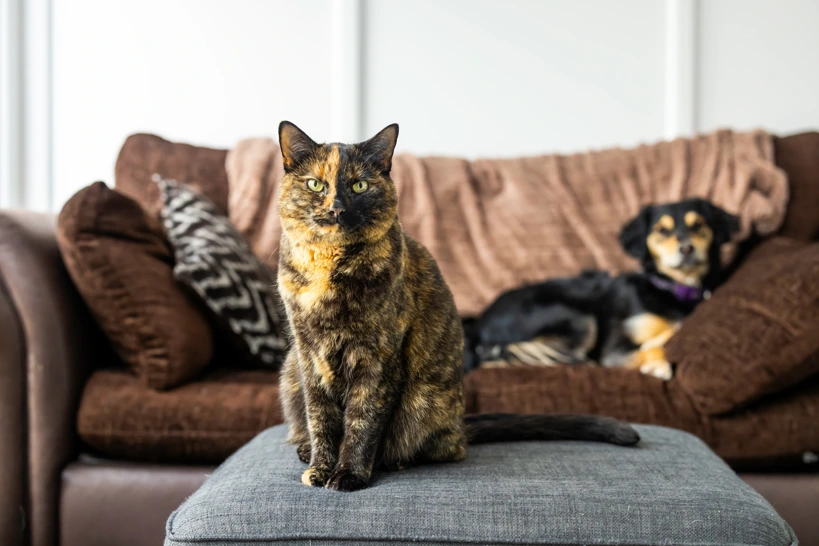21st June 2024
Alison Richards, Head of Clinical Services for Cats Protection, said: “We’re a nation of pet lovers and whether you’re a cat person or a dog person – or maybe a bit of both – you’ll want to keep your pet safe this summer. Many pets love to enjoy the great outdoors, but it’s important to bear in mind that very hot weather can put them at risk of illness and injury.”
Paula Boyden, Veterinary Director of Dogs Trust, says: “The sunshine might be great for us, however hot weather can cause problems for our canine friends. Dogs can’t regulate their body heat in the same way as humans, so extra care needs to be taken, especially when exercising or travelling in the car. In this weather, there is no safe amount of time to leave your dog alone in the car, even if you leave the window open.

“The good news is that steps can be taken to prevent our dogs suffering, such as only walking dogs in the coolest parts of the day, reducing their exercise, ensuring dogs have access to somewhere cool and shady to lay down and making sure they always have access to fresh water.”
The two charities have come up with a checklist to help owners keep cats and dogs safe this summer:
• Be sun safe: Very hot weather can cause serious injuries in both cats and dogs. Dogs walked on tarmac can suffer painful burns to their paws, so it’s important to check the ground on warm days. You can do this by holding your hand to the ground for five seconds – if it’s too hot for you, it’s too hot for your dog. While cats will generally find themselves a cool spot on hot days, it’s important to remember they can suffer sunburn and develop skin cancer. Cats with white ears are particularly at risk, so speak to your vet about suitable suncream.
• Keep cool: Heatstroke can be serious for both cats and dogs and in some cases, it can be fatal. It’s a good idea to keep your pet indoors between 10am and 3pm on hot days and wait until it’s cooler in the evening to walk dogs or let cats outside. Even in mild temperatures, the biggest cause of heatstroke in dogs is exercise. In both cats and dogs, brachycephalic breeds – those with flat faces such as pugs or Persian cats – will be at increased risk of heatstroke, as their short facial structure can cause breathing difficulties and make it harder for them to keep cool. Kittens, puppies and elderly cats and dogs will also be at higher risk, as will those which have underlying health conditions.
• Signs of heatstroke: Cats or dogs suffering with heatstroke will need urgent veterinary treatment, so owners should be familiar with the signs. For both cats and dogs, this can include heavy breathing or panting, excessive drooling, diarrhoea, confusion, restlessness, vomiting, being drowsy and collapsing. If you suspect your pet has been affected by heatstroke, call your vet immediately for advice.
• Water and shade: Just like humans, cats and dogs can easily become dehydrated in hot weather, so make sure they have plenty of fresh water. Pop an extra water bowl in the garden if your pet is outdoors a lot, and make sure pets always have access to shade.
• Be plant aware: Some garden plants can be highly poisonous, so take a look around the garden to see if there’s anything which may pose a risk to your pet. Lilies are particularly dangerous for cats, and ingesting just a small amount of pollen can be fatal.
• Garden hazards: Most cats and dogs love spending more time in the garden in warm weather, so take a few minutes every week to check its safe for them. Check fences for any broken panels which dogs can escape from, or any sharp edges which may catch your pet. If you keep chemicals, engine oils or antifreeze in your shed, make sure these cannot be reached by inquisitive pets, as these can be toxic.
• Never leave pets in cars: Pets should never be left alone in cars as even just a few minutes in a hot car can prove fatal. As cats and dogs can’t cool down the same way as humans, the heat can quickly become dangerous for them. If you see a dog in a pet in distress, call 999 immediately.
For more information on keeping cats and dogs safe this summer, visit cats.org.uk or dogstrust.org.uk
Ends
For further information or an interview, please contact Cats Protection Media Office on 01825 741 911, at media.office@cats.org.uk, or @CPMediaTeam on Twitter.